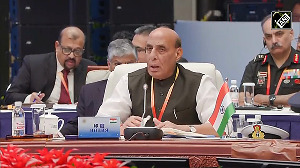Nearly 500 people were killed and over 2,400 injured when a massive earthquake struck Algiers, the capital of Algeria, and nearby towns on Wednesday.
As rescue workers toiled through the night, scrabbling at mounds of rubble to reach families trapped in ruined homes, the toll rose rapidly in the early hours of Thursday.
"Buildings have collapsed. Entire families are underneath," Prime Minister Ahmed Ouyahia said as the state media appealed for medical staff to report for work to cope with mounting casualties.
Measuring 6.7 on the open-ended Richter scale, the quake sent terrified residents running into the streets in Algiers and towns to the east, closer to the epicentre, along the populous Mediterranean coastal strip. It was felt as far away as Spain.
One of the worst affected places was Rouiba, a relatively prosperous city some 30 km from the eastern suburbs of Algiers, where one building after another was reduced to a pile of rubble in a scene of utter devastation.
"I have never seen such a disaster in my life. Everything has collapsed," said Yazid Khelfaoui, who lost his mother in the disaster. The rubble of his apartment block was all around him.
Algerian state television, which gave the casualty figures, showed dozens of bodies lined up under sheets and blankets, some clearly children. Among the wounded treated in hospital, one was a child, bandaged around the head and with blood on his face.
Also badly hit was the coastal city of Boumerdes -- where media reports spoke of people jumping from windows as they tried to save themselves. State television also said a small hospital had collapsed in Boumerdes, but gave few details.
Security Alert
"It's about saving lives tonight," Prime Minister Ouyahia told state radio early on Thursday. "It's a tragic moment It's a misfortune that hits the whole of Algeria."
He said security forces were on alert to stop looting in a country riven by a decade of violence by Islamist rebels. More than 100,000 have died and the economy has suffered despite hefty export earnings from natural gas and oil.
President Abdelaziz Bouteflika oversaw the crisis response.
State media broke into programmes to urge people to go outdoors and stay away from buildings: "Leave your home, turn off the gas and don't use elevators. Stay calm," they said.
A Reuters correspondent in Algiers said the tall building where he was shuddered markedly for some seconds in the tremor. Some 200 aftershocks hit northern Algeria in the first two hours and authorities warned many more would follow.
At Algiers' principal Mustapha hospital families gathered to ask about the fate of loved ones. Police forced back the growing crowd, said a Reuters reporter at the scene.
"I want to see my brother. I want to know if he is dead or still alive. Please let me get inside," said Ahmed, 40, who had come to Algiers from Rouiba. He wept as he spoke.
The US Geological Survey's National Earthquake Information Centre said the epicentre was 70 km (45 miles) east of Algiers, and 10 km (six miles) below ground.
Most of Algeria's 32 million people live in the north, away from the desert. Algiers alone is home to at least 2.6 million.
A spokesman for the US institute said the quake was the biggest to hit the North African country since 1980, when a tremor measuring 7.7 killed at least 4,500 people in the west.
In 1994, about 150,000 were made homeless by an earthquake in northwestern Algeria, with the death toll over 170. An earthquake in 1999 killed 22 people.
(Additional reporting by Paul de Bendern in Algiers)






